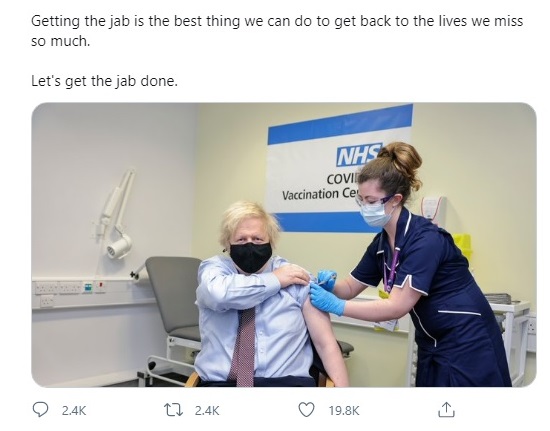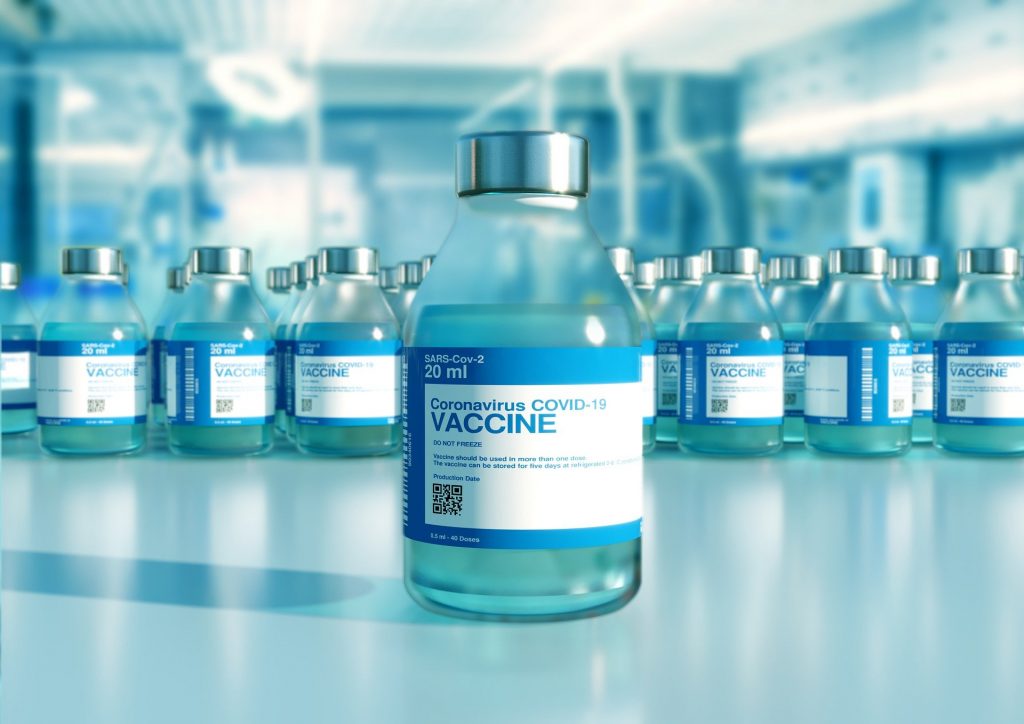
The Government’s coercive messaging is: if you want your life back, get the jab.
On the last day of 2020, I wrote a piece that opens: ‘My hope for 2021 is that all thinking people – including scientists – become more questioning and critical of science’.
Sadly, as we approach the end of the first quarter of 2021, things seem to have gone the other way. Thinking people have become more unthinkingly enthusiastic about science as salvation. Even our faith leaders have fallen under the spell of scientism, as I wrote in this piece on my blog a month ago.
Many of my fellow Brits seem to have unthinkingly (or rather group-thinkingly) chosen to be injected with one of the anti-covid-19 medicines that have suddenly appeared on the market, agreeing to participate in the ongoing trials of these medicines. The mRNA vaccines are, as the biotechnology sector boasts, the first medicines of their kind, with the promise of future ‘transformative’ medicines to ‘deliver on the promise [sic] of mRNA science’ (more on this later).
In other words, the Covid-19 mRNA medicine is the gateway drug to mRNA drugs that will increase our life expectancy. But – and this is a serious question – even if the biotech sector can deliver on its promises, do we really want to increase life expectancy through transformative medicine? I suspect that many people do, but personally, I do not (more on this later).
In the context of eternity, I do not see the point in rewriting any of my ‘software of life’ (Moderna’s words to describe mRNA) in order to live on earth for an extra 20 years or so. I am now 60. I imagine that if I live to my 80s, God willing, or even my 90s, I will feel that I have experienced enough of life on earth, a life, like that of most other people I know, of great joys, and suffering, and of service and duty. At the end of my life, I will have gratitude for everything God has given me in this life, a gratitude that, in the meantime, I try to express to God every waking day.
I work in science and have friends and family who are very capable of reading scientific material from organisations such as Pfizer, BionNTech, Moderna, and the USA’s Food and Drugs Administration (FDA), but have not done so, and have just ‘had the jab’ (and most have just turned up for an appointment to take a medicine without even first enquiring what it is!). Everyone I know has accepted ‘the science’ on authority, and everyone I know who has been offered a vaccine has accepted it. The consensus seems to be that if you cannot trust a combination of Big Pharma and Big ‘Coronavirus-Act’ Government, whom can you trust?
Of course, if we want something to be true, or untrue, or intuitively believe something to be true, or untrue, we generally seek the evidence to confirm our bias, and look favourably on its source. And scientists are as prone to confirmation bias as everyone else, if not more so. For instance, scientists, and the institutions they work for, are unlikely to publish failed experiments, or null results. Apart from anything else, it would be bad marketing to do so, and, whether the science organisation is a commercial or academic one, it needs to attract huge funds from investors, sponsors, governments and charities (such as medical research charities, and the omnipresent Bill and Melinda Gates Foundation). This failure to publish null results is sometimes called ‘publication bias’. It is a serious problem in science, and frankly, despite all the international cooperation in many areas of science, it is impossible to overcome.
I am still hoping that, after all the post Covid-19 debriefs, people will come to generally accept there is no such thing as ‘the science’, i.e. some kind of objective and value-free truth through which we can shape society.
Those of us who are suspicious of Big Pharma are likely to point to the many $billions that companies such as Pfizer, Johnson and Johnson, Astra Zenica, GlaxoSmithKleine, etc. have paid out in civil and criminal fines for false claims in the past two decades, and the many ongoing lawsuits. See also Jacqueline Laing’s piece on this website, including a catalogue of sources on the many scientific objections to this ‘warp speed’ universal vaccination program. Those who have ‘had the jab’, are likely to brush all this off, along with the fact that in the USA, where much of this new-generation medicine comes from, medicine is a leading cause of death, such as, famously, the over-prescription of opioid medicines. Overuse of medicine is particularly problematic in the USA, where direct-to-consumer marketing of drugs is allowed, unlike in the EU and the UK, at least until the Covid-19 vaccines came on the market! The John Hopkins University – one of the USA’s top medical schools – tells us that medical errors are now the third leading cause of death in the US.
Why in 2021 does the consensus seem to be readily accepting that Big Pharma is suddenly making wholly true claims, when it has a recent history of serial false claims? Perhaps after a year of hearing about deaths and disease (despite only a modest percentage increase in excess deaths in 2020), ‘death’ is at the front of people’s mind, hence the need to believe in ‘the science’ and the vaccines.
I have noticed that enthusiasts for the universal vaccination program will find the authorities to support what they already believe. These same authorities insist that those of us who have declined the vaccine are social pariahs, or at best ‘selfish’. Even HM the Queen has been convinced by this relentless messaging, and was recruited into saying that her vaccine ‘didn’t hurt at all’, and that those of us who don’t have the jab are selfish. Similarly, this short clip on the BBC website offers some scientifically-woolly and patronising explanations of why those of us who turn down the vaccine are putting the rest of you in danger. But many scientists involved in medicines and vaccine development do not accept this Big Pharma, Big Tech, Big NGO and Big Government consensus reality, and believe, rather, that trying to vaccinate our way out of a virus pandemic is likely to protract the pandemic and ultimately increase the potency of the virus. (Toby Young’s website Lockdown Sceptics provides a balanced mixture of scientists enthusiastic about Covid-19 vaccination, and scientists concerned by it.)
I’m a humanitarian. I really do hope there is no long-term harm to anyone, or offspring conceived by vaccinated adults, for the duration of the ongoing long-term (‘phase 3’) clinical trials.
And yet the perceived success of the biotech mRNA vaccines also fills me with foreboding. Already the Centers for Disease Control and Prevention (CDC), which in the USA carries the authority that the NHS does in the UK, are enthusing that “Future mRNA vaccine technology may allow for one vaccine to provide protection for multiple diseases…”.
CDC’s short non-technical page on ‘understanding mRNA COVID-19 vaccines’ talks of vaccines not just for viruses, but for cancer. When, as the CDC hope, they have solved death by viruses and cancers, biotechnology will surely be expected to stop brain decay and heart decay, and other problems that would result from increased life expectancy, including, with the prospect of longer life, more depression and mental illness, suicide being the biggest killer for men under 45.
We need to remember here that the goal of biotechnology – and the reason it is receiving so much investment and attention from Silicon Valley’s super rich – is not merely prophylactic medicine as we now know it, but massive life extension and anti-aging technology.
Moderna’s ‘About Us’ webpage says they ‘believe mRNA is the “software of life”’ and that ‘Moderna’s Mission: Deliver on the promise of mRNA science to create a new generation of transformative medicines for patients’.
And so if the Covid-19 biotech vaccines are perceived to be a success, enthusiasm for transformative medicine will perhaps be unstoppable. And if this happens, the proposed vaccination passports really will separate the ‘clean’ from us ‘unclean’ and ‘selfish’.
I suggest we need wider discussions, and intelligent discussions, rather than patronising brainwashing by those already enthused by the prospect of transformative medicines. Obviously, many people will want transformative medicine if Big Pharma promises them it will make them live longer. Not only I am wary of the promises of Big Pharma, but, as noted, I do not want to augment my my expected natural life through a new generation of medicines. I will respect people who make the choice to try technology-driven life extension, but I expect society to respect my own informed choices not to do so.
My worldview is informed by reason and faith. I appreciate that not everyone’s is, but for those who are interested, here is a piece on my personal blog in which I look at life and death and ‘the promise of mRNA science’ in the context of eternity.








Comments